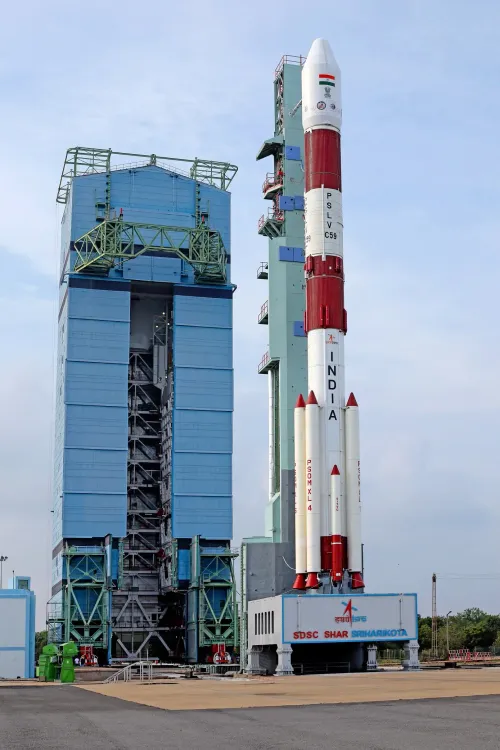ISRO Successfully Launches ESA's Proba-3 Mission into Space

Sriharikota (Andhra Pradesh), Dec 5 (NationPress) The Indian Space Research Organisation (ISRO) achieved a significant milestone on Thursday by successfully launching the European Space Agency (ESA) Proba-3 mission, dedicated to observing the Sun, aboard the PSLV-C59 launch vehicle.
The launch took place from the First Launch Pad (FLP) at Satish Dhawan Space Centre (SDSC-SHAR), in Sriharikota.
"PSLV-C59 has successfully ascended into the atmosphere, marking the initiation of a global mission spearheaded by NSIL, with ISRO's technical support, to deploy the ESA’s innovative PROBA-3 satellites," the Indian space agency shared on X.
"This is a moment of pride that celebrates the synergy of international cooperation and India's achievements in space," it added.
The ESA’s Proba-3 is the first mission launched from India since the Proba-1 mission in 2001, highlighting the strengthening of space collaboration between the two entities. This launch also signifies India's expanding role in global space exploration.
The PSLV-C59 vehicle is set to transport the Proba-3 spacecraft into a highly elliptical orbit as a dedicated commercial mission for NewSpace India Ltd (NSIL).
The objective of the Proba-3 mission is to investigate the Sun's faint corona near the solar edge. It serves as an in-orbit demonstration (IOD) mission for the ESA, aiming to showcase precise formation flying capabilities.
"This mission, driven by NSIL with ISRO’s engineering excellence, exemplifies the power of international collaboration. It is a remarkable milestone in India's space journey and a shining illustration of global partnerships," ISRO stated.
The launch was previously delayed due to an unidentified anomaly that occurred even though the countdown proceeded smoothly.
The Proba-3 satellites were transported from Liege in Belgium to Chennai airport, and subsequently trucked to the spaceport in Sriharikota.
The mission comprises two spacecraft—the Coronagraph Spacecraft (CSC) and the Occulter Spacecraft (OSC)—which were launched together in a stacked configuration aboard the PSLV-XL rocket, as noted by ISRO. This marks the 61st flight of the PSLV and the 26th utilizing the PSLV-XL configuration.
According to the Indian space agency, the spacecraft will create a 144-meter-long instrument known as a solar coronagraph, allowing scientists to study the Sun's corona, which is challenging to observe due to the brightness of the solar disk.
PSLV-C59 stands as a testament to ISRO's engineering capabilities, with this mission being the 61st flight, showcasing the popularity of the PSLV-XL variant.









